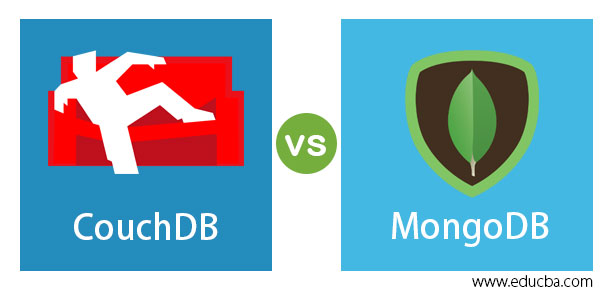Difference Between CouchDB vs MongoDB
The CouchDB is a NoSQL type database that is available as open-source that helps to provide web services and web accessibility. The CouchDB database provides web services that are compatible with various devices. The data stored in CouchDB is in key-value pairs and JSON (JavaScript Object Notification) format. MongoDB is another type of NoSQL database that is used for storing huge chunks of data. The MongoDB database is capable of storing data in a huge volume. The MongoDB database is capable of scalable when there is a need of storing more chunks of data in the database. Here we discuss CouchDB vs MongoDB.
Head to Head Comparison Between CouchDB vs MongoDB (Infographics)
Below are the top 9 differences between CouchDB and MongoDB:
Key Differences Between CouchDB vs MongoDB
Below are the major key differences between CouchDB and MongoDB:
- The main key difference between CouchDB and MongoDB is the availability and consistency of the database. The MongoDB database supports the consistency factor, while, on the other hand, CouchDB supports the availability factor. The MongoDB uses the replication model in which there are multiple nodes and stores the data in all the replicated nodes.
- The next difference between the two types of databases is storage schema. The CouchDB offers Restful APIs for inserting the data, editing the data, read the data, and deleting the data documents. In the document, some fields can be booleans, numbers, lists, and many more. In MongoDB, there is no such schema, and data can be freely stored in BSON format.
- The other difference between CouchDB and MongoDB is the use of indexes in the database. MongoDB uses the indexes to read the data, as without using the indexes, the read time can increase, which can affect the database performance. CouchDB uses indexes that are similar to SQL indexes.
- The CouchDB database uses the Erlang programming language for development and also supports various operating systems like Linux, OS, Windows, Android, iOS, Solaris, and BSD. CouchDB also supports various other languages like PHP, Perl, Ruby, Python, Smalltalk, and many more. The programming language supported by the database is C, C++, C#, Delphi, Groovy, Java, MatLab, JavaScript, Python, Scala, PHP, Prolog, PowerShell, and many more.
- The other important difference between the MongoDB database and the CouchDB database is the support for handling errors and bugs. The MongoDB database is comparatively better to support errors and bugs compared to the CouchDB database. The developers and programmers prefer MongoDB over CouchDB for data storage operations.
- The other factor that can be considered for differentiating the CouchDB and MongoDB databases is security standards. Both databases follow a high standard of security, but the CouchDB has some additional security features which make the CouchDB database more secure compared to the MongoDB database.
- The use of containers is there in the MongoDB database that acts as an additional layer, whereas in CouchDB, there is no such functionality present in the database. The extra layer of containers helps to manage the task more properly and execute the operations properly in the MongoDB database.
CouchDB vs MongoDB Comparison Table
Here is a comparison table showing similarities between CouchDB and MongoDB:
| Factor | CouchDB | MongoDB |
| Storage Schema | The data is stored in JSON format. The CouchDB database uses the document-oriented type model. | The data is stored in BSON format and follows the document-oriented type model. |
| Programming Language | CouchDB uses the Erlang programming language for development. | MongoDB uses the C++ programming language for development.
|
| Support for the SQL | No support for SQL in the CouchDB database. | MongoDB supports the SQL queries (read-only) that use the MongoDB connector. |
| Use of Interface | The interface used by the CouchDB database is the HTTP/REST interface. The interface used is properly defined for the user so that it can be easily used. | MongoDB uses different protocols in place of the interface. The protocols used are custom protocol and binary protocol that lay over the TCP/IP model. |
| Storage of Object | The CouchDB uses the documents to store the data in the database. | MongoDB uses collections to store data in a database. And in collections, the documents are there for data storage. |
| Replication Model | The replication model supported by the CouchDB database model is the master-master model. | The replication model supported by the MongoDB database model is a master-slave model. |
| Method of Query | The map/reduce type query method is used in the CouchDB database model. | The object-oriented query language is used and also map/reduce the query method issued in the MongoDB database model. |
| Performance | The CouchDB performance is much better than the MongoDB database schema. | The MongoDB database faces the performance issue and lacks behind when it is compared to the CouchDB database. |
| Failover Mechanism | The failover procedure is slow in the CouchDB database. When one master goes down, it takes time to switch over to the next master for data storage operations. | In the MongoDB database, the failover mechanism is fast compared to the CouchDB database. |
Conclusion
The MongoDB database and the CouchDB database are powerful databases that are issued to store huge chunks of data and perform data storage operations in no time. Both databases support both types of data i.e. structured data and unstructured data.
Recommended Articles
This is a guide to CouchDB vs MongoDB. Here we discuss the difference between CouchDB vs MongoDB and their key differences with infographics and comparison tables. You may also have a look at the following articles to learn more –




